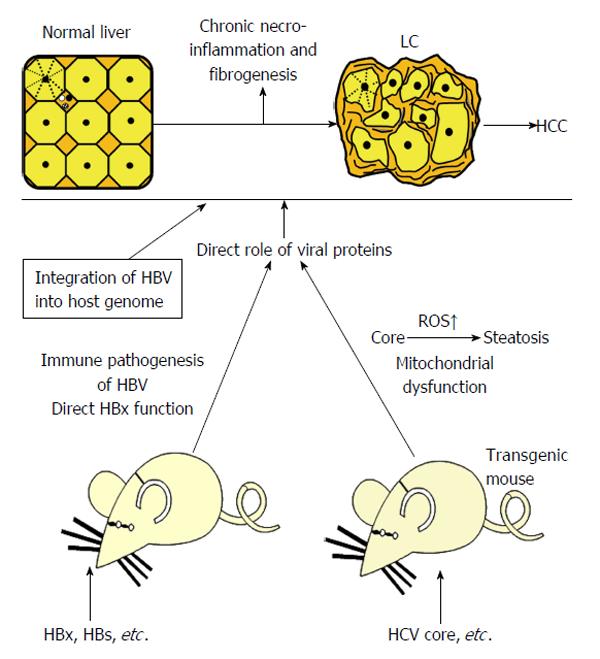Copyright
©The Author(s) 2015.
World J Hepatol. Dec 8, 2015; 7(28): 2834-2840
Published online Dec 8, 2015. doi: 10.4254/wjh.v7.i28.2834
Published online Dec 8, 2015. doi: 10.4254/wjh.v7.i28.2834
Figure 1 Outline of the overall aspects of this review.
The mainstream mechanism of HBV- or HCV-induced hepatocarcinogenesis is necroinflammation and hepatocyte-regeneration sequences that eventually result in cirrhosis where HCC frequently develops. However, transgenic mouse studies have clarified the significant contribution of viral proteins to hepatocarcinogenesis by directly affecting cellular machinery. A close association of HCV core protein and hepatic steatosis has been established by transgenic mouse studies. In addition to the inherent insertional mutagenesis mechanism of HBV, results from transgenic mouse studies have also suggested the direct involvement of HBV proteins in hepatocarcinogenesis. HBV: Hepatitis B virus; HCV: Hepatitis C virus; HCC: Hepatocellular carcinoma; ROS: Reactive oxygen species; HBs: Hepatitis B surface; HBx: Hepatitis B virus X.
- Citation: Ohkoshi S, Hirono H, Watanabe K, Hasegawa K, Yano M. Contributions of transgenic mouse studies on the research of hepatitis B virus and hepatitis C virus-induced hepatocarcinogenesis. World J Hepatol 2015; 7(28): 2834-2840
- URL: https://www.wjgnet.com/1948-5182/full/v7/i28/2834.htm
- DOI: https://dx.doi.org/10.4254/wjh.v7.i28.2834









